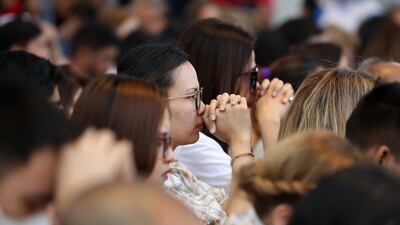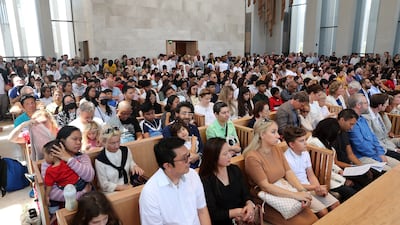A powerful call for peace infused with optimism has united thousands of people from the Abrahamic faiths in prayer, marking a special time on the spiritual calendar as Ramadan, Easter and Passover coincide.
In a world reeling from conflict and suffering, religious heads and residents are seeing it as a time to celebrate, accept differences and reflect on the common threads that bind diverse communities in the UAE.
Churches in the UAE were filled with joyful celebrations as the Christian community was celebrating Easter this weekend after a month of fasting and prayer.
The Muslim faithful have crossed the halfway mark during a month of fasting that is also a time for reflection, sacrifice and forgiveness.
For the first time in the UAE, members of the Jewish community were gathering in a purpose-built synagogue on Saadiyat Island for the eight-day Passover festival that began on April 5 and ends next week. Others met in homes and hotels.
When greetings of Happy Easter, Ramadan Kareem and Chag Sameach or ‘Happy Festival’ are exchanged, it also symbolises the unique position of the Emirates where people of the world’s major religions visibly celebrate their faith.
Need for a ‘reliable hope’
Bishop Paolo Martinelli, the head of the Catholic Church in the UAE, Oman and Yemen, was optimistic of the power of peace, unity and goodwill to echo across the globe on Easter Sunday and going forward.
“We need a reliable hope on which to build relationships and promote the common good together with all men and women of goodwill,” he said in an Easter message shared with The National.
“This announcement of joy and hope also resounds even today in a world afflicted by so much suffering and uncertainty. There are wars and conflicts that bring destruction and death to many in different parts of the world.
“Sometimes even in our hearts, we have doubts and fears about the future.”
As pews filled up across the emirates, parishioners packed into churches and stood outdoors to listen to services that celebrated the resurrection of Christ.
Christians have been inviting friends and family home, exchanging food, pastries and chocolate eggs.
The bishop called on people to promote reconciliation, build a more fraternal world as they enjoy a festival that proclaimed the victory over evil and death.
“We are a church of migrants, made up of people from different nations, cultures, languages, and rites.
“The same Paschal faith and the same baptism unite us,” the Bishop said in a reference to new beginnings.
“We are called to witness that it is possible to be different and united simultaneously. The world needs this testimony.”
Embracing differences

During the holiest month of the Islamic calendar, Muslims abstain from food and drink from sunrise to sunset and strengthen their faith through increased recitation of the Quran.
Many devote more time on charitable work, others perform Umrah, an optional pilgrimage to Makkah, the birthplace of the Prophet Mohammed in Saudi Arabia.
As the final 10 nights of Ramadan draw nearer, piety is believed to increase with the tahajjud prayers held from midnight onwards at mosques.
Abdullah Mohammad Al Ansari, an Emirati Islamic scholar, spoke of the values of harmony that Islam upheld.
“The very foundation of the religion is to bring people closer together, fostering harmony and understanding among diverse groups of individuals,” he told The National.
“The understanding of differences in colour, language, race and even understanding and perception as a divine law and one of God’s splendid signs has been the cornerstone of the UAE’s approach to fostering a culture of coexistence and tolerance.”
He said while some nations suffered from conflict and discord as they failed to accept differences, the UAE’s multicultural environment enabled people of different faith to perform religious rituals and celebrate occasions without limits on their freedom.
“The UAE has exemplified how embracing differences and understanding the essence of Islam can lead to a prosperous, harmonious society where everyone can coexist peacefully, Mr Al Ansari said.
“The unique example of the UAE is the result of a country of rulers, government and people who build on the principle of — You and I are children of one father and one mother, we all strive to fulfil God’s saying in the Quran: Surely this community of yours is one community and I am your lord, so worship me.”
Mohammed Saleem, imam of a mosque in Sharjah, said inclusivity was built into the country’s framework.
“This proud nation built on the principles of tolerance, respect and unity has become a shining example of harmonious coexistence in today’s world,” he said.
Opportunity for dialogue
The Jewish community said they cherished the spiritual freedom to celebrate the eight-day festival that began with the main ceremony of “seder”, or order, in Hebrew.
A festive meal followed to include matzah — an unleavened flatbread — during which the story of the liberation of the Israelites from slavery in ancient Egypt was retold at different stages during the meal.
During the week, Jews are asked to eat the flat, cracker-like matzah made from flour and water and baked.
Marc Sievers, director of the American Jewish Committee, said observing Passover was integral to their beliefs.
He was among those who attended a service at the synagogue at the Abrahamic Family House.
The milestone site on Abu Dhabi’s Saadiyat Island hails the shared values of Islam, Judaism and Christianity with a mosque, synagogue and church at one site.
“It’s a wonderful opportunity to reflect on the openness of the society here and the decision of the leadership to welcome people of all different backgrounds and religions,” said Mr Sievers, head of a private, non-profit organisation.
“The Abrahamic Family House gives actual physical form to this by having the mosque, church and the synagogue in the same compound even though each is separate and has its own congregation.”
Thousands of Jews will travel to the UAE this year to explore the country, attracted by stories of safety and tolerance shared by others who live and work here.
“It is very remarkable thing and we feel fortunate to be here and to see this happen,” Mr Sievers said.
“As Jews we see a wonderful opportunity here in the UAE for the monotheistic religions to encounter each other and to promote peace and understanding.
“It provides a special chance for the followers of all three religions to have dialogue.”






















